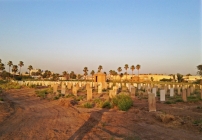| First Name: | Joseph | Last Name: | BRIGHTMORE | |
|---|---|---|---|---|
| Date of Death: | 05/10/1916 | Lived/Born In: | Tidal Basin | |
| Rank: | Private | Unit: | Royal West Kent2 | |
| Memorial Site: | ||||
Current Information:Age-27 36, Bengeo Street, Tidal Basin Baghdad (North Gate) War Cemetery, Iraq
When the Ottoman Empire allied itself to Germany in 1914, Britain found herself at war with Turkey, a war that was not only fought in Gallipoli, Egypt and Palestine, but also in Mesopotamia, the land between the rivers Tigris and Euphrates which is now modern day Iraq. Britain had vital oil interests around Basra in the south and troops were sent there to protect them. During 1915 and 1916, British and Indian troops began pushing north with their eye on the prize of Baghdad, which after a series of victories and reverses was finally captured in March 1917. But the Turks continued to strenuously defend their territory until the final end came in October 1918, when they signed an armistice. From 7th December, 1915 until 29th April, 1916 an 8,000 strong British and Indian force were besieged by the Turks in the town of Kut on the River Tigris, some 100 miles south of Baghdad. This was the force that had advanced on Baghdad in 1915 but which had been defeated at Ctesiphon in November, 1915 and had then fallen back to Kut. Here they were besieged, their only hope being a relief force that was making its way slowly up the Tigris from Basra but which arrived too late to save the garrison. Two companiesd of the 2nd Royal West Kent battalion were attached to 30 Brigade of the 6th (Poona) Division of the Indian Army and were part of the Kut garrison. When the siege came to an end Joseph Brightmore was taken prisoner and died from wounds in captivity on 5th October, 1916. The biggest danger faced by the troops in Mesopotamia was disease. Sickness was rife, brought about by temperatures of nearly 50⁰ Centigrade, poor sanitation and regular flooding all of which encouraged flies, mosquitoes and rats. Clean water was always a big problem in the desert and consequently water-borne diseases such as typhoid and cholera claimed many victims. This was specially so for prisoners of war whose needs and welfare were sorely neglected. |
||||
| « Back to Search Results | ||||
| If you think any of the information shown here is incorrect, Click Here to submit your amends and comments | ||||




